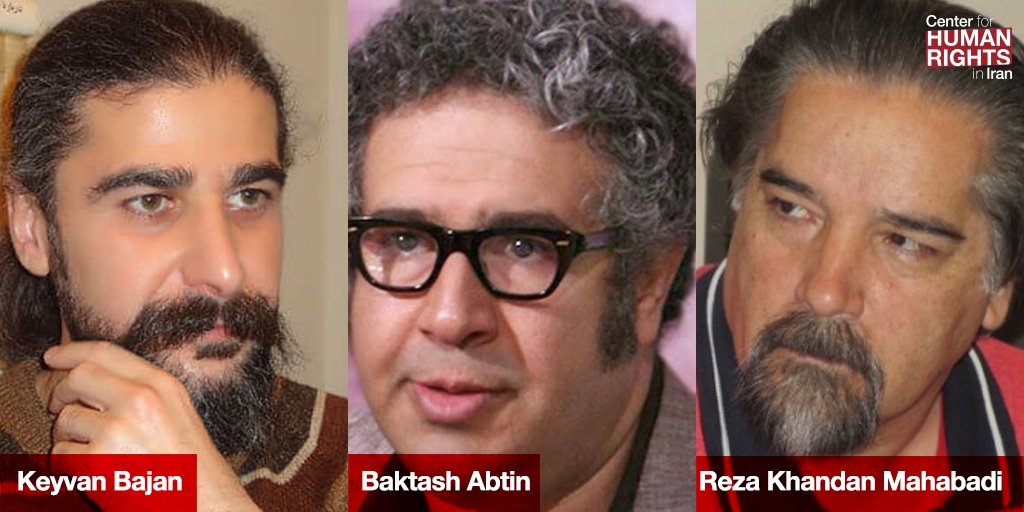Iran: drop charges against writers facing COVID-19 threat in prison
RAPID ACTION NETWORK
21 May 2020
RAN 02/2020
PEN International is deeply concerned about the summoning to prison of three Iranian writers, Baktash Abtin, Reza Khandan-Mahabadi, and Keyvan Bazhan, who were convicted in May 2019 for their critical writings. PEN International believes that the charges against all three writers are in violation of their right to freedom of expression, and calls upon the Iranian authorities to immediately quash the convictions. All three are currently on bail prior to custodial sentences. In March 2020, they were ordered to report to prison, but chose not to do so owing to the outbreak of COVID-19 in Iran, which is particularly acute in prisons.
'Baktash Abtin, Reza Khandan-Mahabadi, and Keyvan Bahzan should never have been charged, certainly not convicted, and should by no means be sent to jail particularly at the present time, given the outbreak of COVID-19 in Iran. They are writers facing prosecution and persecution simply because they have written critically and consistently about successive Iranian governments. Rather preposterously, one of the charges they have faced is visiting the graves of dissident writers. At the time of the pandemic which has had serious impact in Iran, its government’s priority should be protecting public health, and not intimidating or jailing writers,' said Salil Tripathi, Chair, PEN International’s Writers in Prison Committee.
TAKE ACTION: Please send appeals:
Urging the Iranian authorities to drop all charges against writers Baktash Abtin, Reza Khandan-Mahabadi, and Keyvan Bazhan, in accordance with Article 19 of the International Covenant on Civil and Political Rights (ICCPR), to which Iran is a state party;
Calling on the Iranian authorities to end the abuse of the legal system to persecute writers, and to immediately release all those held in prison for having exercised their rights to freedom of opinion and expression.
Send appeals to:
Leader of the Islamic Republic
Grand Ayatollah Sayed ‘Ali Khamenei
The Office of the Supreme Leader Islamic Republic Street
End of Shahid Keshvar Doust Street, Tehran, Islamic Republic of Iran Email: http://www.leader.ir/langs/en/...
Twitter: @khamenei_ir (English-language account), @Khamenei_ar
(Arabic-language), @Khamenei_es (Spanish-language account).
Head of the Judiciary
Ayatollah Sadegh Larijani c/o Public Relations Office
Number 4, Deadend of 1 Azizi – Vali Asr Street Tehran,
Islamic Republic of Iran
President of the Islamic Republic of Iran
Hassan Rouhani
Pasteur Street, Pasteur Square Tehran, Islamic Republic of Iran
Email: [email protected] http://rouhani.ir/register.php
Twitter: @HassanRouhani (English) and @Rouhani_ir (Persian)
And copy to the Embassy of Iran in your country. You can find embassy addresses here.
Please inform PEN International of any action you take and of any responses you receive. PEN members are also encouraged to share information about Baktash Abtin, Reza Khandan-Mahabadi, and Keyvan Bazhan and their Centres’ campaigning activities via social media.
Publicity
PEN members are encouraged to:
Publish articles and opinion pieces in your national or local press highlighting the cases of Baktash Abtin, Reza Khandan-Mahabadi, and Keyvan Bazhan and freedom of expression in Iran;
Share information about Baktash Abtin, Reza Khandan-Mahabadi, and Keyvan Bazhan and your campaigning activities via social media;
Please keep PEN International informed of your activities.
Background
Khandan-Mahabadi, Abtin and Bazhan are members of the Iranian Writers’ Association (IWA), and each has published numerous books of Iranian history, sociology and literary criticism. They were convicted on counts of spreading propaganda against the system, illegal assembly and collusion against national security on 15 May 2019. These relate to their joint authorship of a book about the history of the IWA which has for decades been critical of successive Iranian governments. They were also accused of visiting the graves of dissident poets and writers. Khandan-Mahabadi and Abtin were each sentenced to a total of six years imprisonment, while Bazhan was sentenced to three years in prison.
They have been consistently denied access to legal representation since their first hearing on 22 January 2019, in response to which all three have refused to defend themselves against the charges. Since then, they have been released on bail of one billion Rial (approximately $240,000 USD) each.
In March 2020 the three writers were notified that they should report to prison, however, owing to the serious danger of contracting COVID-19, they did not do so. In March 2020, the Iranian authorities ordered the temporary release of prisoners in the face of the spread of COVID-19. By end of April over 100,000 prisoners had been freed while riots and outbreaks inside jails were reported.
Click here for Mahabadi's books, here for Abtin’s books and here for Bazhan’s books.
PEN International is alarmed about the large number of writers and activists in Iran who have been detained or imprisoned solely for exercising their right to freedom of expression. PEN International’s 2019 Case List includes a number of writers in prison and on trial in Iran. This is in violation of the Islamic Republic of Iran’s obligations under international human rights law, mainly through restricting the rights to freedom of expression, association and peaceful assembly. PEN International’s concerns for these imprisoned writers is made more acute in light of the COVID-19 outbreak and reports of violence in prisons.
For further details contact Cathy McCann at PEN International, email: [email protected]

